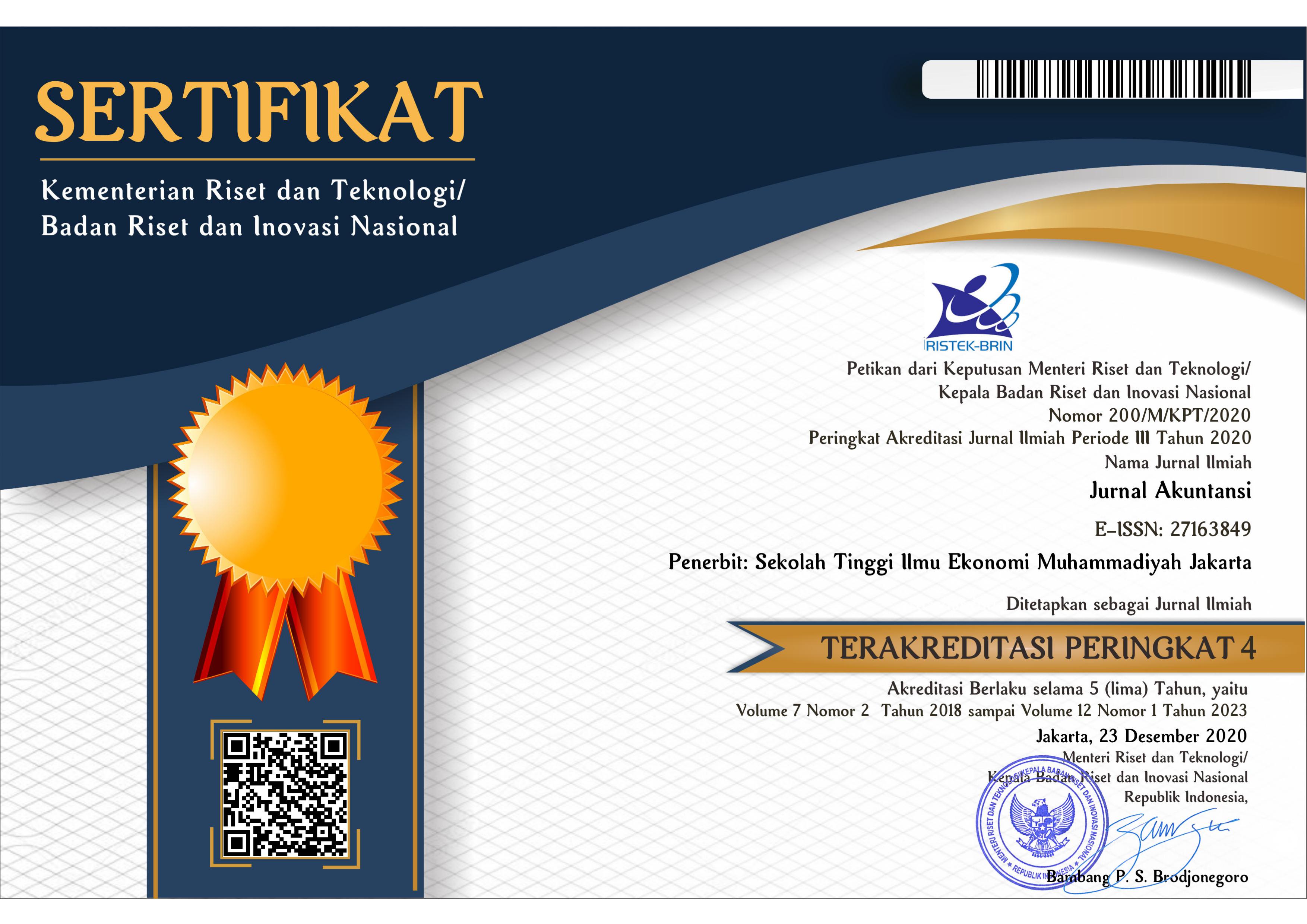GEMI, NASTITI, NGATI-ATI: SEBUAH TINJAUAN ETIKA AKUNTAN MANAJEMEN DALAM KONTEKS KEBERLANJUTAN
DOI:
https://doi.org/10.37932/ja.v11i1.520Keywords:
etika, akuntan manajemen, filosofi jawa, keberlanjutan, etika akuntanAbstract
Akuntan manajemen memiliki peran yang sangat besar dalam merespon isu keberlanjutan. Oleh karena itu, akuntan manajemen harus mengembangkan sikap yang berpedoman pada etika akuntan manajemen. Salah satu sikap yang dapat dikembangkan adalah gemi, nastiti, ngati-ati, yang merupakan konsep dari filosofi Jawa yang berkaitan dengan isu keberlanjutan. Tujuan artikel ini adalah untuk mengeksplorasi lebih jauh konsep gemi, nastiti, ngati-ati dari perspektif etika akuntan manajemen dari perspektif keberlanjutan. Penelitian ini menggunakan pendekatan library research dengan mengumpulkan berbagai macam literatur terkait filosofi gemi, nastiti, ngati-ati dan dielaborasikan dalam etika akuntan manajemen dalam konteks keberlanjutan perusahaan. Secara singkat, hasil penelitian ini menunjukkan bahwa jika dikaitkan dengan etika akuntan manajemen, Gemi dapat dicerminkan bahwa akuntan manajemen harus dapat menilai dengan tujuan ekonomis apa yang mereka maksud dan apa yang seharusnya. Lebih lanjut, Nastiti, akuntan manajemen harus mengandalkan kompetensi profesional dan kehati-hatian dalam melaporkan informasi, terutama informasi mengenai keberlanjutan perusahaan. Dan terakhir, Ngati-ati, selain etika kehati-hatian profesional, dalam kaitannya dengan falsafah Jawa ini, akuntan manajemen juga harus memperhatikan etika kerahasiaan, integritas, dan juga perilaku profesionalnya dalam menyikapi isu-isu keberlanjutan. Secara keseluruhan, keterlibatan akuntan manajemen di masa depan dalam akuntansi dan pelaporan keberlanjutan akan bergantung pada kemampuan mereka untuk memperluas domain keahlian yang ada/tradisional dengan memperoleh pengetahuan dan mengembangkan keterampilan dan kompetensi baru yang secara tradisional terkait dengan bidang keahlian lainnya.Management accountants have a very big role in responding to sustainability issues. Therefore, management accountants must develop an attitude that is guided by the ethics of management accountants. One attitude that can be developed is gemi, nastiti, ngati-ati, which are concepts from Javanese philosophy related to sustainability issues. The purpose of this article is to explore further the concept of gemi, nastiti, ngati-ati from the perspective of management accountant ethics from a sustainability perspective. This study uses a library research approach by collecting various kinds of literature related to the philosophy of gemi, nastiti, ngati-ati and elaborated on management accountant ethics in the context of corporate sustainability. Briefly, the results of this study indicate that when it is associated with management accountant ethics, Gemi can be reflected that management accountants must be able to judge with economical objectives what they mean and what they should be. Furthermore, Nastiti, management accountants must rely on their professional competence and prudence in reporting information, especially information regarding company sustainability. And lastly, Ngati-ati, in addition to the ethics of professional prudence, in relation to this Javanese philosophy, management accountants must also consider the ethics of confidentiality, integrity, and also their professional behavior in responding to sustainability issues. Overall, it appears that management accountants' future involvement in sustainability accounting and reporting will depend on their ability to expand existing/traditional domains of expertise by acquiring knowledge and developing new skills and competencies that are traditionally related to other areas of expertise.References
Ascani, I., Ciccola, R., & Chiucchi, M. S. (2021). A structured literature review about the role of management accountants in sustainability accounting and reporting. Sustainability (Switzerland), 13(4), 1–25. https://doi.org/10.3390/su13042357
Botes, V., Low, M., & Chapman, J. (2014). Is accounting education sufficiently sustainable? Sustainability Accounting, Management and Policy Journal, 5(1), 95–124. https://doi.org/10.1108/SAMPJ-11-2012-0041
Boulianne, E., Keddie, L. S., & Postaire, M. (2018). (Non)Coverage of sustainability within the french professional accounting education program. Sustainability Accounting, Management and Policy Journal, 9(3), 313–335. https://doi.org/10.1108/SAMPJ-09-2017-0119
Giuliani, M., & Chiucchi, M. S. (2019). Guess who’s coming to dinner: the case of IC reporting in Italy. Journal of Management and Governance, 23(2), 403–433. https://doi.org/10.1007/s10997-018-9432-x
Giuliani, M., & Marasca, S. (2011). Construction and valuation of intellectual capital: a case study. Journal of Intellectual Capital, 12(3), 377–391. https://doi.org/10.1108/14691931111154698
Idowu, S. O. (2011). Accounting for decision makers in a sustainable environment. In Theory and Practice of Corporate Social Responsibility (pp. 209–228). Springer.
Lutfillah, N. Q., Mangoting, Y., Wijaya, R. E., & Djuharni, D. (2016). Konstruksi Tanggung Jawab Auditor Perspektif Mamayu Hayuning Bawana. Jurnal Akuntansi Multiparadigma, 7(1), 36–50.
Margerison, J., Fan, M., & Birkin, F. (2019). The prospects for environmental accounting and accountability in China. Accounting Forum, 43(3), 327–347. https://doi.org/10.1080/01559982.2019.1601147
Mills, R. (1999). Elkington, John. Cannibals with forks: the triple bottom line of 21st century business. Counterpoise, 3(2), 34.
Mirzaqon, A., & Purwoko. (n.d.). Studi Kepustakaan Mengenai Landasan Teori Dan Praktik Konseling Expressive Writing. 1–8.
Mistry, V., Sharma, U., & Low, M. (2014). Management accountants’ perception of their role in accounting for sustainable development. Pacific Accounting Review, 26(1/2), 112–133. https://doi.org/10.1108/PAR-06-2013-0052
Özsözgün Çalişkan, A. (2014). How accounting and accountants may contribute in sustainability? Social Responsibility Journal, 10(2), 246–267. https://doi.org/10.1108/SRJ-04-2012-0049
Riyani, D. R. D., & Ardini, L. (2021). Kontruksi Prinsip Dasar Etika Profesi Akuntan: Internalisasi Karakter Pewayangan Pandawa Lima. WACANA EKONOMI (Jurnal Ekonomi, Bisnis Dan Akuntansi), 20(2), 84–93.
Schaltegger, S. (2017). Sustainability as a fundamental challenge for management accountants. In The Role of the Management Accountant (pp. 274–291). Routledge.
Serena Chiucchi, M. (2013a). Intellectual capital accounting in action: enhancing learning through interventionist research. Journal of Intellectual Capital, 14(1), 48–68. https://doi.org/10.1108/14691931311289011
Serena Chiucchi, M. (2013b). Measuring and reporting intellectual capital : Lessons learnt from some interventionist research projects. Journal of Intellectual Capital, 14(3), 395–413. https://doi.org/10.1108/JIC-03-2013-0036
Tingey-Holyoak, J., & Pisaniello, J. D. (2019). Water accounting knowledge pathways. Pacific Accounting Review, 31(2), 258–274. https://doi.org/10.1108/PAR-01-2018-0004
Uly, Y. A. (2018). Filosofi Jawa Dipakai Wamenkeu Mardiasmo dalam Kelola Keuangan Negara. Economy.Okezone.Com. https://economy.okezone.com/read/2018/09/04/20/1945674/filosofi-jawa-dipakai-wamenkeu-mardiasmo-dalam-kelola-keuangan-negara
Winarno, W. A., & Sawarjuwono, T. (2021). Kritik Atas Triple Bottom Line: Perspektif Memayu Hayuning Bawana.
Downloads
Published
Issue
Section
License
License Terms




